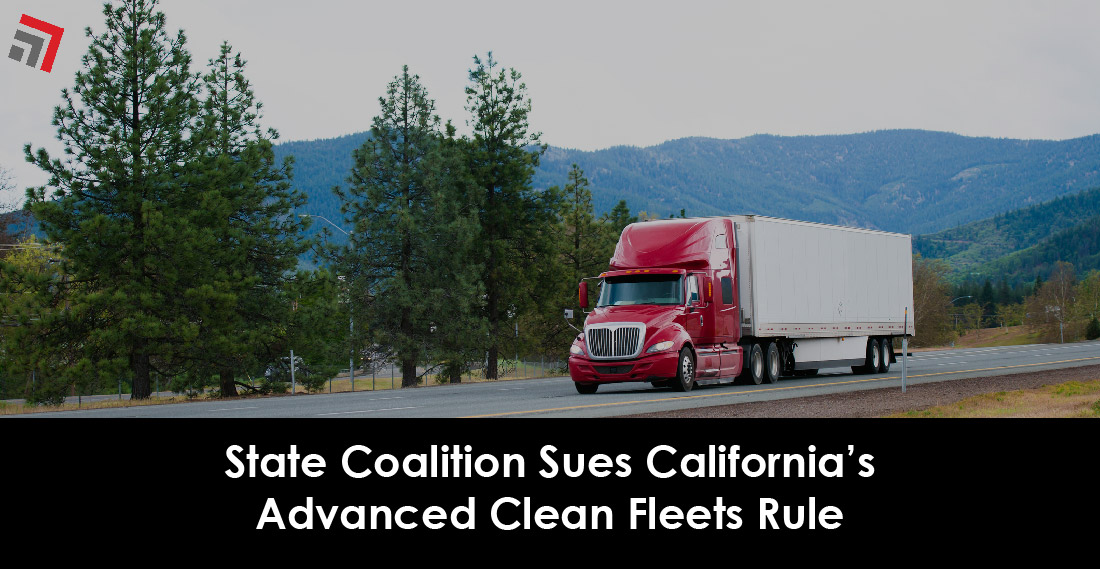A coalition of 17 states are suing California’s Advanced Clean Fleets (ACF) rule, seeking to block the regulation while it awaits a waiver from the U.S. Environmental Protection Agency (EPA).
The group of states in this legal action closely mirrors the collective that filed a suit last year against another form of controversial California regulation—the Advanced Clean Trucks (ACT) rule.
California’s ACT and ACF rules are complimentary to one another in shared vision but are different in their intended function. ACT targets OEM (truck) manufacturers, while ACF is concerned with companies, like motor carriers, that purchase and operate commercial vehicles. Comparatively stricter than federal emissions rules, both ACT and ACF introduce aggressive standards and accelerated timelines for compliance.
While the cast of plaintiffs is mostly parallel, the key difference between the two lawsuits is the defendant. The June 2023 filing against ACT was directed towards the EPA, which at the time had already granted California a waiver to implement the Clean Trucks regulation.
However, in the recent suit, filed May 13 in U.S. District Court for the Eastern District of California, a single man, not a federal agency, is on the receiving end of the legal contest. The suit against ACF is against Steven Cliff, the executive officer of the California Air Resources Board (CARB), a state agency responsible for defining and mandating vehicle emissions standards.
ACF rule is already paused following CTA lawsuit
Currently, California’s implementation of ACF is already paused, as the regulation reels in from another legal offensive. In October, the rule received a suit filed by the California Trucking Association (CTA), a trade group that has proven to be litigiously aggressive against state regulators. CTA’s suit argued that ACF requires the same waiver from the EPA which ACT had to receive in order for it to be enacted.
While CARB initially protested that such a waiver is not necessary for ACF, the California agency ultimately did file a request with the EPA following CTA’s lawsuit. The two parties forged an agreement that the state would not enforce ACF until the verdict on an EPA waiver is announced. Conversely, CTA agreed that it would not attempt to block ACF through an injunction, a legal path it is actively pursuing against another California law, AB5.
The ACF suit was filed by 17 states: Alabama; Arizona; Arkansas; Georgia; Idaho; Indiana; Iowa; Kansas; Louisiana; Missouri; Montana; Nebraska; Oklahoma; South Carolina; Utah; West Virginia; and, Wyoming. As previously mentioned, most of these states are also plaintiffs in the June 2023 suit against the EPA over the ACT waiver.
California is not like other states
As a privilege endowed within the federal Clean Air Act, California is the only state permitted to issue its own vehicle emissions standards, subject to a waiver from the EPA. From there, other states may choose to follow whichever standards California implements or defer to existing federal ones. However, the main point is that other states cannot set their own standards, a unique privilege only available to the Golden State.
While California’s status as the most populated state and, arguably, the most influential trade asset in the country does warrant special consideration, other states have long criticized federal regulators for granting California its own autonomy to dramatically alter climate policy that can transcend the state’s borders.
It is not uncommon for other states to follow California’s emissions standards. While this is a choice each state can make for itself, opponents argue that California’s influence to spread controversial laws affects the entire U.S.
For example, Iowa, a plaintiff state in both ACF and ACT lawsuits, has fervently criticized California and the federal government. Following last year’s ACT waiver from the EPA, Iowa Attorney General Brenna Bird wrote: “The EPA and California have no right or legal justification to force truckers to follow [this] radical climate agenda.”
The majority of states which oppose California’s ACF and ACT rules are concerned how an accelerated push from the Golden State to roll out electric vehicles will threaten the demand for existing fuel sources, like ethanol and biodiesel, whose production supports the economies of these states.
Final Thoughts
For more information on California’s Advanced Clean Trucks rule or Advanced Clean Fleets rule.
Contact one of our team members if you have any questions regarding this topic or any others in cross-border logistics.
More blogs similar to this:



Recent Comments